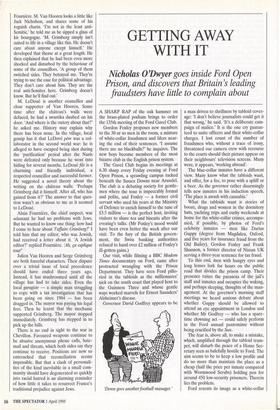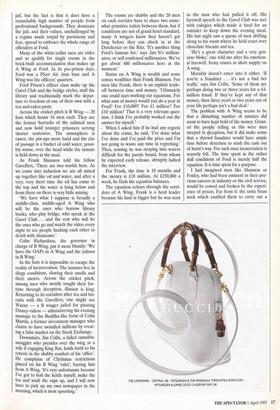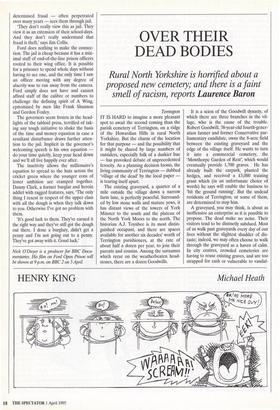GETTING AWAY WITH IT
Nicholas O'Dwyer goes inside Ford Open
Prison, and discovers that Britain's leading fraudsters have little to complain about
A SHARP RAP of the oak hammer on the brass-plated podium brings to order the 135th meeting of the Ford Gavel Club.
Gordon Foxley proposes new members to the 30 or so men in the room, a mixture of white-collar fraudsmen and lifers near- ing the end of their sentences. `I assume there are no blackballs?' he inquires. The new boys become members of the most bizarre club in the English prison system.
The Gavel Club begins its meetings at 6.30 sharp every Friday evening at Ford Open Prison, a sprawling campus tucked beneath the Sussex Downs near Arundel. The club is a debating society for gentle- men where the tone is impeccably formal and polite, and Foxley — a former civil servant who used his years at the Ministry of Defence to enrich himself to the tune of £3.5 million — is the perfect host, inviting visitors to share tea and biscuits after the evening's talks. (Mr Foxley's mood would have been even better the week after our visit. To the fury of the British govern- ment, the Swiss banking authorities refused to hand over £2 million of Foxley's ill-gotten gains.) Our visit, while filming a BBC Modem Times documentary on Ford, came after protracted wrangling with the Prison Department. They have seen Ford pillo- ried in the tabloids as the millionaires' nick on the south coast that played host to the Guinness Three and whose gentle ways worked marvels for Ernest Saunders' Alzheimer's disease.
Governor David Godfrey appears to be `Down goes another football manager.' a man driven to shrillness by tabloid cover- age: `I don't believe journalists could get it that wrong,' he said. It's a deliberate cam- paign of malice.' It is the one cry guaran- teed to unite officers and their white-collar charges. I lost count of the number of fraudsmen who, without a trace of irony, threatened our camera crew with recourse to the courts should their picture appear on their neighbours' television screens. Many were, it appears, `working abroad'.
The blue-collar inmates have a different view. Many know what the tabloids want, and offer, for a fee, to pose with a spliff or a beer. As the governor rather disarmingly tells new inmates in his induction speech, `The place is awash with cannabis.'
What the tabloids want is stories of booze, drugs and women in the dormitory huts, yachting trips and cushy weekends at home for the white-collar crimes, accompa- nied, if possible, by photos of Ford's celebrity inmates — men like Darius Guppy (degree from Magdalen, Oxford, and five years for insurance fraud from the Old Bailey), Gordon Foxley and Frank Shannon, a former director of Nissan UK serving a three-year sentence for tax fraud.
To this end, men with hungry eyes and long lenses lurk for hours on the public road that divides the prison camp. Their presence raises the paranoia of the jail's staff and inmates and occupies the waking, and perhaps sleeping, thoughts of the man- agement. At the governor's morning staff meetings we heard anxious debate about whether Guppy should be allowed to attend an eye appointment in London and whether Mr Godfrey — who has a spare- time clowning act — could safely perform in the Ford annual pantomime without being crucified by the Sun.
The fear is, above all, to make a mistake, which, amplified through the tabloid trum- pet, will disturb the peace of a Home Sec- retary seen as balefully hostile to Ford. The aim seems to be to keep a low profile and do no more than maintain the place as a cheap (half the price per inmate compared with Wormwood Scrubs) holding pen for around 450 low-security prisoners. Therein lies the problem.
Ford resents its image as a white-collar jail, but the fact is that it does have a remarkably high number of people from professional backgrounds. They dominate the jail, and their values, unchallenged by a regime made torpid by parsimony and fear, spread to embrace the whole range of offenders at Ford.
Many of the white-collar men are older and so qualify for single rooms in the brick-built accommodation that makes up A Wing at Ford. In its pre-prison days, . Ford was a Fleet Air Arm base and A Wing was the officers' quarters.
Ford Prison's officer class make up the Gavel Club and the bridge circles, staff the library and traditionally mark the depar- ture to freedom of one of their own with a tea-and-cakes party.
Across the cricket pitch is B Wing — 20 huts which house 16 men each. They are the former barracks of the enlisted men and now hold younger prisoners serving shorter sentences. The atmosphere is rawer, the pin-ups more lurid and the rite of passage is a bucket of cold water, possi- bly worse, over the head while the inmate is held down in the mud.
As Frank Shannon told his fellow Gavellers, 'There are two worlds here. As we come into induction we are all mixed up together like oil and water, and after a very, very short time the oil has come to the top and the water is lying below and from there on there is very little mixing.
`We have what I suppose is broadly a middle-class, middle-aged A Wing who will be the ones who borrow library books, who play bridge, who speak at the Gavel Club . . . and the rest who will be the ones who go and watch the video every night to see people hacking each other to death with chainsaws.'
Colin Richardson, the governor in charge of B Wing, put it more bluntly: 'We have the OAPs in A Wing and the yahoos in B Wing.'
In the huts it is impossible to escape the reality of incarceration. The inmates live in dingy conditions, sharing their smells and their snores. Across the cricket pitch, among men who mostly sought their for- tune through deception, illusion is king. Returning to its corridors after tea and bis- cuits with the Gavellers, one might see Wayne — a B winger jailed for pirating Disney videos — administering his evening massage to the Buddha-like form of Colin Martin, a former investment manager who claims to have swindled millions by creat- ing a false market on the Stock Exchange.
Downstairs, Jim Collis, a failed cannabis- smuggler who presides over the wing as a wily if engaging King Rat, holds forth to his coterie in the shabby comfort of his 'office'. He complains of Christmas restrictions placed on his B Wing 'valet', barring him from A Wing. 'It's very unfortunate because I've got to boil the kettle myself, make the tea and wash the cups up, and I will now have to pick up my own newspaper in the morning, which is most upsetting.' The rooms are shabby and the 20 men on each corridor have to share two some- what primitive toilets between them, but if conditions are not of grand hotel standard, many A wingers know they haven't got long before they can check in at the Dorchester or the Ritz. 'It's another thing Ford's famous for,' says Jim.`It's million- aires, or self-confessed millionaires. We've got about 480 millionaires here at the moment.'
Status on A Wing is wealth and none comes wealthier than Frank Shannon. For men like Frank, there is an explicit trade- off between time and money. `Ultimately one could start working out equations. For what sum of money would you do a year in Ford? For £10,000? For £1 million? For £10 million? That is a very relevant ques- tion. I think I've probably worked out the answer for myself.'
• When I asked him if he had any regrets about the crime, he said, 'I've done what I've done and I've paid the price and I'm not going to waste any time in regretting.' Then, sensing he was straying into waters difficult for the parole board, from whom he expected early release, abruptly halted the interview.
For Frank, the time is 18 months and the money is £18 million. At £250,000 a week, he finds the equation balances.
The equation echoes through the corri- dors of A Wing. Frank is a herd leader because his haul is bigger but he was seen as the man who had pulled it off. His farewell speech to the Gavel Club was met with eulogies which made it hard for an outsider to keep down the evening meal. His last night saw a queue of men drifting along to his room where he held court over chocolate biscuits and tea.
`He's a great character and a very gen- uine bloke,' one told me after his emotion- al farewell. Irony comes in short supply on A wing.
Morality doesn't enter into it either. 'If you're a fraudster . . . it's not a bad bet really,' says Jim Collis. 'Some of them are perhaps doing two or three years for a £4- million fraud. If they've kept any of that money, then three years or two years out of your life perhaps isn't a bad deal.'
The problem with A Wing seems to be that a disturbing number of inmates did seem to have kept hold of the money. Grant- ed the people telling us this were men steeped in 4eception, but it did make sense that a shrewd fraudster would have ample time before detection to stash the cash out of harm's way. For such men incarceration is scarcely felt. The time spent in the rather dull conditions of Ford is merely half the equation. It is time spent for a purpose.
I had imagined men like Shannon or Foxley, who had been eminent in their pre- vious careers in industry or the civil service, would be cowed and broken by the experi- ence of prison. Far from it: the same brass neck which enabled them to carry out a determined fraud — often perpetrated over many years — sees them through jail.
`They don't really view this as jail. They view it as an extension of their school-days. And they don't really understand that fraud is theft,' says Jim Collis.
Ford does nothing to make the connec- tion. The jail is cheap because it has a min- imal staff of end-of-the-line prison officers rooted to their wing office. It is possible for a prisoner to spend whole days without having to see one, and the only time I saw an officer moving with any degree of alacrity was to run away from the camera. Ford simply does not have and cannot afford staff of the calibre or numbers to challenge the defining spirit of A Wing, epitomised by men like Frank Shannon and Gordon Foxley.
The governors seem frozen in the head- lights of the tabloid press, terrified of tak- ing any tough initiative to shake the basis of the time and money equation in case a resultant disturbance draws further atten- tion to the jail. Implicit in the governor's welcoming speech is his own equation do your time quietly, keep your head down and we'll all live happily ever after.
The inactivity allows the millionaire's equation to spread to the huts across the cricket green where the younger cons of lesser ambition are cramped together. Danny Clark, a former burglar and heroin addict with ragged features, says, 'The only thing I resent in respect of the upper class with all the dough is when they talk down to you. Otherwise I've got no problem with them.
`It's good luck to them. They've earned it the right way and they've still got the dough out there. I done a burglary, didn't get a penny and I'm not going out to a penny. They've got away with it. Good luck.'
Nick O'Dwyer is a producer for BBC Docu- mentaries. His film on Ford Open Prison will be shown at 9 p.m. on BBC 2 on 5 April.




























































 Previous page
Previous page